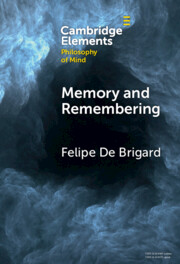Element contents
Memory and Remembering
Published online by Cambridge University Press: 13 November 2023
Summary
Information
- Type
- Element
- Information
- Series: Elements in Philosophy of MindOnline ISBN: 9781108955447Publisher: Cambridge University PressPrint publication: 21 December 2023
References
Accessibility standard: Unknown
Why this information is here
This section outlines the accessibility features of this content - including support for screen readers, full keyboard navigation and high-contrast display options. This may not be relevant for you.Accessibility Information
- 20
- Cited by
